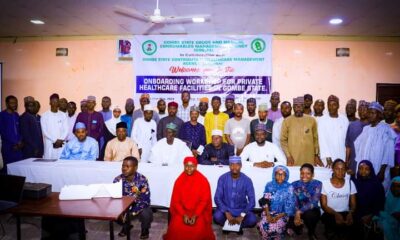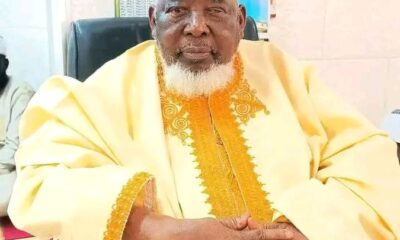Judgement
Court Orders Bauchi Govt to Pay N100m, Apologize to Ex-Accountant General Over Rights Violation

By Khalid Idris Doya
The Federal High Court sitting in Bauchi has ordered the Bauchi State Government to pay the sum of N100 million in general and exemplary damages and publish a public apology in two national dailies to the former Accountant General of the state, Dr. Saidu Abubakar.
The judgment followed a fundamental rights enforcement suit filed by Dr. Abubakar over what he described as illegal arrest, intimidation, harassment, and detention by state agents in connection to his official duties.
Delivering the judgement in suit No. FHC/BAU/CS/43/2024, Justice Aminu Garba ruled that the action of the respondents including Inspector General of Police, Bauchi State Commissioner Of Police, Bauchi State Government, State Security Service (SSS), Attorney General Of Bauchi State, and the Bauchi State Public Complaint Commission, were unconstitutional and a breach of the applicant’s fundamental rights.
The court declared that “Threat, intimidation, unlawful arrest and detention of the applicant by Agents of the respondents with respect to his official duties and functions as Accountant General of Bauchi State is unconstitutional, illegal, unlawful, null and void, and a breach of the applicant’s fundamental Rights pursuant to sections 34(1), 35, 36, 41(1) and 46(1) of the Constitution of the Federal Republic of Nigeria (as amended); Articles 4,5,6 and 12 of the African charter on Human and Peoples’ Rights (Ratification and Enforcement) Act, Laws of Federation(LFN 2004).”
The court ruled that the respondents are not statutorily empowered to direct their agents to harass, intimidate, arrest and detain the applicant without recourse to due process.
The court ruled that the continued detention of the Dr. Abubakar from 9 to 25th September, 2024 is a breach of his Fundamental Right to freedom of liberty, right to movement and the right to dignity of human person as provided under Sections 34,35 and 41 of the 1999 Constitution of the Federal Republic of Nigeria (as amended).
The judge said the continuous detention of the Applicant from 9 to 25 September, 2024 by the Agents of the Respondents without Trial, is illegal, null and void and a flagrant violation of the Applicant’s fundamental Right Pursuant to Section 35(5) of the constitution of the Federal Republic of Nigeria,1999 (as amended).
It further issued an order of perpetual injection restraining the respondents, their agents from further harassment, intimidation, arrest or detention of the applicant with respect to the exercise of his statutory duties.
The court awarded the sum of the sum of N100,000,000.00 (One Hundred Million Naira) as general and exemplary damages against the respondents jointly and severally in favour of the Dr. Abubakar as compensation for the violation of his Fundamental rights, harassment, psychological trauma and for the inconveniences occasioned there from.
The court further directed that a public apology be published in two national newspapers within 14 days of the judgment (from July 1, 2025), with a formal notification to the applicant.
Additionally, the court struck out the name of the fourth respondent, the State Security Service, for lack of sufficient evidence against them.
Efforts to get reactions from the Bauchi State Government proved abortive.
Several calls and messages to the state Attorney General and Commissioner for Justice, Hassan Usman El-Yakub (SAN), as well as the Commissioner for Information and Communications, Hon. Usman Shehu Usman, were unanswered at the time of filing this report.
Judgement
Supreme Court Affirms Party Supremacy, Declines to Reinstate Anyanwu as PDP National Secretary

By Our Correspondent
The Supreme Court of Nigeria has reaffirmed the principle of party supremacy, directing the Peoples Democratic Party (PDP) to handle its internal affairs regarding the dispute over the office of National Secretary.
In a unanimous decision, the apex court dismissed an appeal by Senator Samuel Anyanwu, who sought to overturn the Court of Appeal’s judgment that removed him from the position. The court ruled that political parties have the autonomy to manage their leadership selection processes, provided they adhere to their constitutions and the laws of the land.
The legal battle, which pitted Anyanwu against Rt. Hon. Sunday Udeh-Okoye, had escalated through the lower courts, culminating in this landmark ruling. The Supreme Court set aside the earlier judgment of the Court of Appeal, Enugu Division, which had affirmed Udeh-Okoye as the PDP National Secretary.
In its ruling, the Supreme Court emphasized that the judiciary should not interfere in the internal management of political parties beyond ensuring due process, fairness, and adherence to democratic principles. It urged the PDP leadership, including its National Working Committee (NWC), to resolve the matter in line with the party’s constitution.
The decision is seen as a victory for political party autonomy and a call to strengthen internal democracy. The PDP is now expected to act swiftly in implementing the court’s directive, ensuring unity and stability within its ranks.
With this ruling, the recommendations of the South East Caucus of the PDP, which nominated Rt. Hon. SKE Udeh-Okoye as National Secretary, are likely to be upheld and implemented.
Judgement
Strasbourg Court Rules: No Right to Same-Sex Marriage Under European Convention on Human Rights

By Our Correspondent
In a landmark ruling, the European Court of Human Rights (ECHR) in Strasbourg has unanimously determined that there is no inherent right to same-sex marriage under the European Convention on Human Rights. The decision, rendered by 47 judges representing the 47 member states of the Council of Europe, marks a significant moment in the ongoing debate over same-sex marriage across Europe.
The ruling, which has drawn surprisingly little media attention, was based on a variety of philosophical, anthropological, and legal considerations. The court’s interpretation of Article 12 of the European Convention on Human Rights was central to its decision. Article 12 enshrines the right to marry but does not explicitly guarantee this right to same-sex couples.
The judges asserted that the notion of family, as traditionally understood, pertains specifically to the union between a man and a woman. The court held that there is no obligation under the Convention for member states to open marriage to persons of the same sex. This interpretation aligns with similar provisions in other international treaties, such as Article 17 of the American Convention on Human Rights (San José Pact) and Article 23 of the International Covenant on Civil and Political Rights.
Furthermore, the court addressed concerns about discrimination, stating that governments are not compelled to extend marriage rights to same-sex couples and that reserving marriage for heterosexual couples does not constitute discrimination under the Convention.
The ruling comes amid ongoing debates over the legal recognition of same-sex relationships across Europe. While several European countries have legalized same-sex marriage, this judgment reinforces the principle that such decisions remain within the purview of individual states.
The court’s decision is expected to influence future legal interpretations and legislative actions regarding same-sex marriage in Europe. However, it has also sparked controversy and concern among LGBTQ+ advocacy groups, who argue that the ruling could hinder progress toward equal rights.
As this significant legal development unfolds, it is crucial for the public to be informed. The ruling underscores the complexity of balancing traditional views of marriage with evolving societal norms and the protection of human rights.
This judgment may not be widely covered in mainstream media, but its implications for the rights of same-sex couples across Europe are profound. As discussions on this topic continue, the role of national governments in determining marriage laws remains a pivotal issue in the broader human rights discourse.
-

 Leadership1 year ago
Leadership1 year agoBreaking: African Union Appoints Pantami as Co-Chair of the 4th Industrial Revolution Policy Council
-

 Appointment11 months ago
Appointment11 months agoGombe State Indigene, Appointed New Vice Chancellor (ATBU)
-

 Politics2 years ago
Politics2 years agoFormer Gombe State APC Promoters Forum Chairman Attacked Following Political Commentary
-

 Health1 year ago
Health1 year agoGombe State Organizes Onboarding Workshop for Private Healthcare Facilities
-

 Death6 months ago
Death6 months agoProminent Nigerian Islamic Scholar, Sheikh Sa’idu Hassan Jingir, Passes Away
-

 Water1 year ago
Water1 year agoGombe Government Mobilizes Stakeholders to Combat Illegal Water Connections
-

 Politics1 year ago
Politics1 year agoGombe State Inaugurates Human Capital Development Council
-

 Politics1 year ago
Politics1 year agoGombe State Launches Presidential Palliative Program (PPP) to Aid Small Businesses
